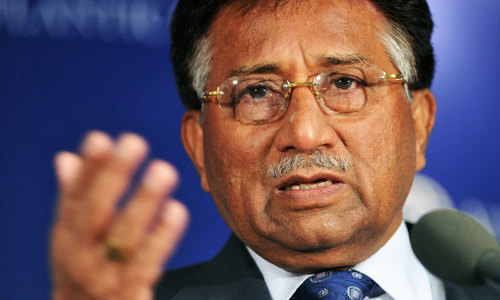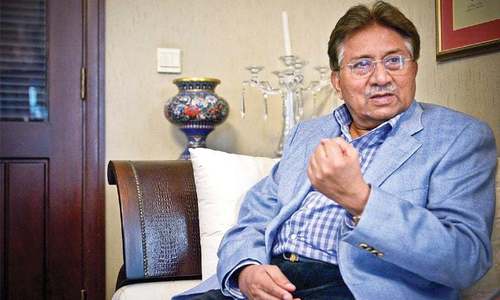ISLAMABAD: A special court seized with a high treason case against retired Gen Pervez Musharraf directed the interior ministry on Thursday to take steps for the arrest and extradition of the former military dictator to Pakistan.
The court comprising Peshawar High Court Chief Justice Yahya Afridi, Lahore High Court Chief Justice Yawar Ali and Justice Tahira Safdar, senior puisne judge of the Balochistan High Court, also directed the joint secretary of the interior ministry to attach Mr Musharraf’s properties in the United Kingdom and the United Arab Emirates.
The interior ministry informed the court that it was difficult to attach even local properties of the accused as four out of seven properties were owned by the former army chief. And even these properties are disputed since spouse of the former dictator Sehba Musharraf, his daughter Ayla Raza and another relative Hidayatullah Kheshgi have claimed co-ownership of them.
During the hearing, Justice Afridi asked head of prosecution Mohammad Akram Sheikh to suggest the way forward since Mr Musharraf is abroad and the court has declared him a proclaimed offender.
Chief prosecutor informs special court there are precedents in which high-profile personalities were tried in absentia
The chief prosecutor said that since the prosecution had laid the entire evidence in September 2014 and Mr Musharraf was required to either appear in person to testify under Section 342 of the Criminal Procedure Code or submit a written statement so that the court could conclude the trial pending for about four and a half years.
Justice Afridi remarked that the special court had already held that the trial could only be resumed after the arrest or surrender of Mr Musharraf.
Advocate Sheikh pointed out that there were precedents that some high-profile personalities were tried in absentia.
The chief prosecutor said that the federal government did not want to grab the properties of Mr Musharraf, but the complaint was filed since he held the Constitution in abeyance on Nov 3, 2007, when he imposed an emergency.
He said if the court issued the direction the government would initiate the process to extradite the former army chief from the UAE. He pointed out that several people, including the former chairman of the Evacuee Trust Properties Board and former president of the Bank of Punjab Hamesh Khan, have been brought to Pakistan under the orders of the court.
Advocate Sheikh suggested that the court might also direct the interior ministry to block the computerised national identity card and passport of Mr Musharraf. He said that in the past the government in some cases had withdrawn the decoration (military medals) from the convicted or accused officers.
When Justice Afridi asked Advocate Sheikh to explain why Mr Musharraf had gone abroad and why the federal government failed to bring him back, he replied that after filing of the complaint in December 2013, the special court granted the accused bail, hence his custody was being regulated by the special court which observed at least three different times that there was no need either to take him into custody or place his name on the Exit Control List (ECL).
He said Mr Musharraf’s name was on the ECL, but the special court allowed him to travel abroad and the Sindh High Court (SHC) also struck down the interior ministry’s memorandum which placed him the ECL. The Supreme Court, however, left it to the special court or the federal government to regulate the custody of the accused since the trial court had already summoned him for recording of statement on March 31, 2016. It effectively fell within the domain of the special court to take action rather than leave it for any other entity like the federal government.
Advocate Sheikh said the prosecution repeatedly informed the special court which had allowed Mr Musharraf to travel abroad for medical reasons, while the accused was in the Armed Forces Institute of Cardiology (AFIC) from January to March 2013 he was not given even a single tablet of Disprin.
Advocate Sheikh said that a former prime minister was not allowed to travel to the UK to inquire after the health of his spouse who was suffering from cancer.
The head of the prosecution argued that instead of conducting trial after short intervals, the special court gave months-long adjournments contrary to the Special Courts Act.
Retired Major Akhtar Shah, counsel for Mr Musharraf, informed the court that his client was planning to come back to the country to face the pending trial before the special court and other courts. He said Mr Musharraf was ready to return if the special court gave an assurance that he would be given security by the defence ministry and would be allowed to travel abroad.
Justice Afridi reminded the counsel that the head of prosecution had already stated that upon his arrival Mr Musharraf would be given the protocol of a former president.
The learned judge, however, said that the court would address concerns of Mr Musharraf once he surrendered himself.
The court adjourned the hearing till March 21.
Published in Dawn, March 9th, 2018














































